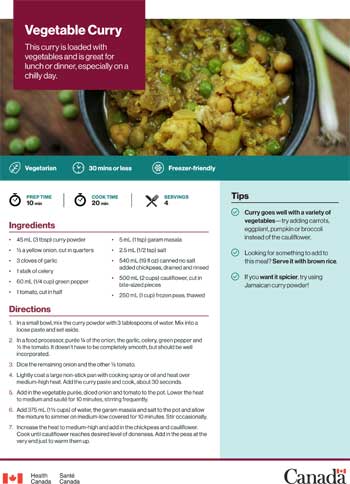Healthy eating during the COVID-19 pandemic: Meal planning
Meal planning helps you and your family be prepared, which is especially important right now. By planning your meals and snacks, you can save money, reduce food waste and limit trips to the grocery store.
On this page
- Plan your meals
- Grocery shopping during the COVID-19 pandemic
- Making the most of your food supply during the COVID-19 pandemic
- Meal planning on a budget
Plan your meals
Plan 1 week’s worth of meals and snacks.
Check your fridge, freezer and pantry for foods and leftovers you already have.
Think of meals you can make using these foods or get inspired by recipes, meal and snack ideas and planned leftovers.
Keep a grocery list handy. Add items that you need or are running low on.
Bring a grocery list
Organize your grocery list by headings that match the sections of the store.
Sticking to items on your grocery list will help you:
- avoid impulse or panic buys
- navigate the grocery store quickly
- make less frequent trips to the grocery store
Gradually stock up on essentials but avoid panic buying
Gradually stock up on food that has a long shelf life.
Gradually stocking up on food is easier on your budget and the supply chain than making large-scale purchases.
Stocking up on food allows you to stay home if you or a household member becomes sick or needs to self-isolate.
Access to safe food is critical to prevent life-threatening reactions for people:
- who require special diets
- living with food allergies, sensitivities, and gluten-related disorders
If you are purchasing specialty food items when you don’t need them, it puts those who rely on these items at risk.
Learn more about avoiding allergens and gluten in foods.
Grocery shopping during the COVID-19 pandemic
Try to limit the number of:
- trips to the grocery store to once per week
- people from your household going into the store
Try to shop at off-peak hours. Some grocery stores are offering special shopping hours for seniors and high-risk individuals.
While grocery shopping, keep your distance from others to stay safe. If an aisle seems too crowded, return to it when there are fewer people.
Use your grocery list to help you. If possible, you should plan to buy any food item you touch with your hands.
At the cash, place your food items in your bags to avoid someone else touching your items.
For more information on safe shopping, visit COVID-19 and food safety.
Plan ahead in case you get sick or have to self-isolate
Make sure you have access to safe and healthy food if you get sick or have to self-isolate. You can:
- find meal programs that deliver
- buy your groceries online and have them delivered
- think of a family member, friend, neighbour or co-worker that could do the grocery shopping for you if needed
Making the most of your food supply during the COVID-19 pandemic
Proper food storage can prevent food from spoiling and reduce food waste.
Store fresh food properly
Food will last longer if you store it properly right away.
Put perishable foods at the front of the fridge instead of at the back. If you can see them, it will be a reminder to eat them.
Keep track of the fresh food you have at home and plan to use up the older ones first. Berries or spinach should be eaten within a few days of buying them. Apples, potatoes and carrots can last longer.
Use leftovers to reduce food waste
You can conserve your food supply by using leftover ingredients to create new meals. Check out ideas on how to use the same ingredients for different meals.
Put a date on leftovers or foods you put in the freezer to remind you when you made them. Learn more about safe fridge and freezer storage.
Video
Meal planning on a budget
The COVID-19 pandemic poses financial challenges for many Canadians. You can practice healthy eating and still save money.
Compare prices and set a budget
Before going to the grocery store, compare prices using:
- flyers
- coupons
- websites
- mobile apps
Pick the grocery store that can offer you the most discounts. You may also want to see what local resources are available.
Set a budget for the week or month.
Adjust menus and recipes
Replace fresh foods with foods that have a longer shelf life. For example, replace a fresh salad with steamed frozen vegetables.
Use dry or canned beans, lentils and other legumes in your meals several times a week. They are often less expensive protein food choices.
Check out more substitution ideas.
Recipe

Prepare food at home
Prepare and cook foods at home instead of spending extra money on prepackaged and highly processed foods, like grated cheese and pre-seasoned meat. These foods:
- often cost more
- are usually low in vitamins and minerals
Video
Related links
Learn more about meal planning.
Page details
- Date modified: